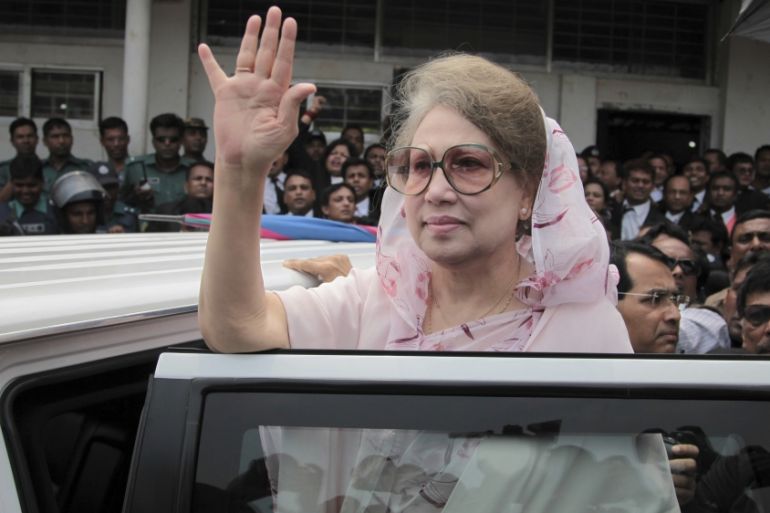Khaleda Zia jailed for five years in corruption case
A Dhaka court jails former Prime Minister Khaleda Zia for five years in orphanage corruption case sparking protests.

Dhaka, Bangladesh – A court in the Bangladeshi capital, Dhaka, has sentenced former Prime Minister Khaleda Zia to jail in a corruption case.
Judge Md Akhtaruzzaman of the Special Court-5 on Thursday sentenced the two-time former prime minister to five years rigorous imprisonment. He read out selected parts of the 632-page verdict.
Keep reading
list of 4 itemsBangladesh PM says vote ‘victory of people’; opposition to continue protest
Sheikh Hasina: Once Bangladesh’s democracy icon, now its ‘authoritarian’ PM
Sheikh Hasina wins fifth term in Bangladesh amid turnout controversy
“The verdict proves no one is above the law,” Law and Parliamentary Affairs Minister Anisul Haque said after the verdict was announced amid tight security.
Zia, chairperson of the country’s main opposition Bangladesh Nationalist Party (BNP), and five others were accused of embezzlement of funds meant for the Zia Orphanage Trust.
Tarique Rahman, Zia’s elder son and heir apparent, and four others were sentenced to 10 years in this politically significant case that comes ahead of general elections due in December.
Rahman, vice chairman of the BNP, has been living in the UK for the past nine years.
The six were accused of embezzling over Tk 21 million ($252,000) from foreign donations intended for a charity named after former President Ziaur Rahman, Zia’s husband.
The four others who also received 10-year jail terms are former legislator Quazi Salimul Haq, former principal secretary to Zia, Kamal Uddin Siddique, Zia’s nephew Mominur Rahman and businessman Sharfuddin Ahmed.
Zia’s political future
The verdict could bar 72-year-old Zia from running in the general elections as the country’s constitution prohibits a convicted person sentenced to over two years from participating.
Zia, decked out in a cream-coloured printed chiffon sari and shawl, and sunglasses, appeared calm while hearing the verdict.
After the verdict, she was taken to the Woman Cell and Daycare Centre at the old Dhaka Central jail, where jail authorities have already renovated her cell.
![BNP supporters clashed with the police in Dhaka [Mahmud Hossain Opu/Al Jazeera]](/wp-content/uploads/2018/02/12b9bdb392fa4cf596d4a49f4fba3c0b_18.jpeg)
Defence lawyer Khandakar Mahbub Hossain said the verdict failed to reflect the truth. “We will go to the higher court against this,” he said, adding that he hoped Zia would receive bail soon.
BNP Secretary-General Mirza Fakhrul Alamgir accused the government of Prime Minister Sheikh Hasina of trying “to keep the BNP out of politics”.
“They have already detained more than 3,000 of our activists and leaders from various parts of the country,” he said.
Alamgir said that, anticipating “what the verdict would be”, Zia had earlier ordered that all BNP activists and leaders “refrain from any violent protests and processions”.
“We call peaceful protests all across the country from Friday noon,” he said.
The BNP had boycotted the last election held in 2014, demanding that the elections be held under a caretaker government.
Police use tear gas
After the verdict, supporters hit the streets of Dhaka, blocking roads and clashing with police.
Earlier, thousands of BNP leaders and activists escorted Zia’s motorcade to court despite an overwhelming presence of security forces in the capital.
Activists from the ruling Awami League and its affiliate organisations had also occupied key points of Dhaka to stop BNP supporters from demonstrating.
The verdict proves no one is above the law
Anticipating blockades and protests, the government had detained several senior BNP leaders, while several others have gone into hiding.
Human Rights Watch (HRW) has called on Bangladesh’s government to stop arbitrary arrests and detentions of opposition BNP activists. It also accused the government of “violating the rights to free expression and peaceful assembly” by preventing opposition supporters from demonstrating.
The HRW, in a statement on Thursday, said Bangladesh should publicly order the security forces to abide by international standards on policing demonstrations.
Brad Adams, Asia director at HRW, said it was crucial for security forces to act with restraint at all times.
“The Bangladesh government’s claims to be open and democratic ring hollow as it cracks down on political dissent,” he said.
Dhaka-based group Ain O Salish Kendra said a “total of 1,786 persons have been arrested in the last eight days”.
First female prime minister
Zia was catapulted into Bangladeshi politics in the early 1980s when her husband former President Ziaur Rahman, was assassinated.
She became the Muslim-majority country’s first female prime minister in 1991 after democracy was restored.
In the 35 years of her political career, Zia has spent time in jail on a number of occasions. This is the first time she has been convicted.
Zia faces a total of 37 cases, charge sheets have been submitted in 17 of them.
After skipping hearings some 143 times over the past six years, Zia finally appeared before the court on October 19, 2017, and obtained bail.
Asif Nazrul, Professor of law at Dhaka University, calls it “a controversial verdict”. “There are many people in the country who will view this as a politically-motivated verdict.”
He added that many people would see it as a tactic for removing the main contender in the election and a way of “demonising a political opponent”.
![Police used tear gas to disperse BNP supporters in Dhaka [Mahmud Hossain Opu/Al Jazeera]](/wp-content/uploads/2018/02/ccb03d66ce44428ab2d0634918ba7417_18.jpeg)